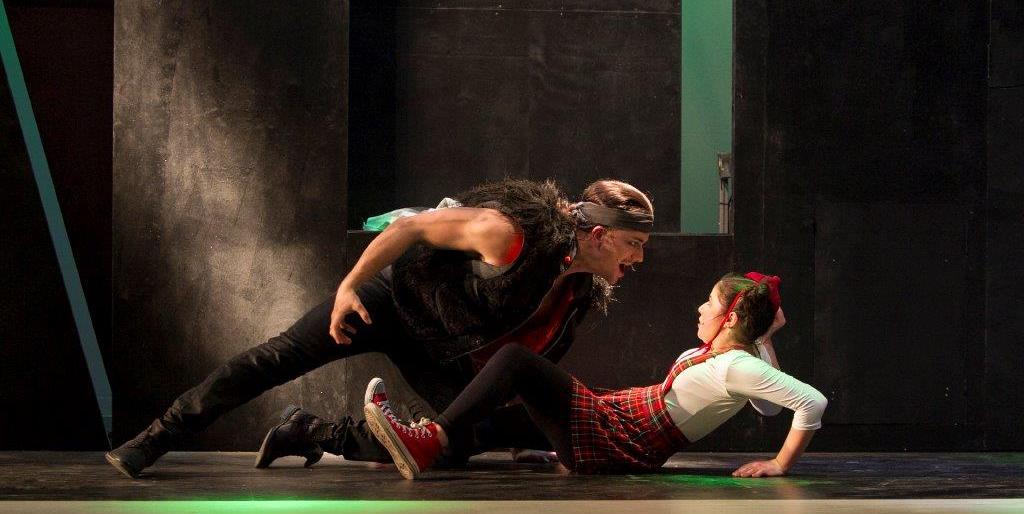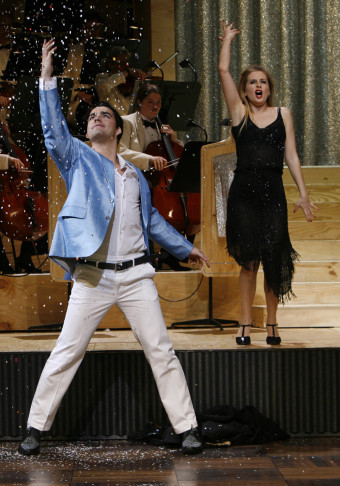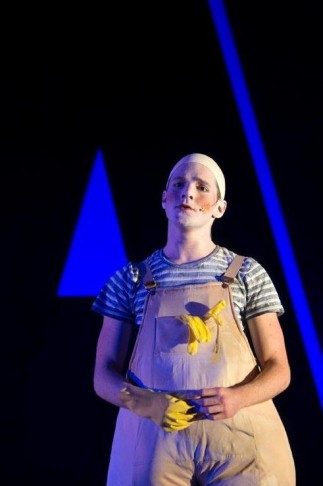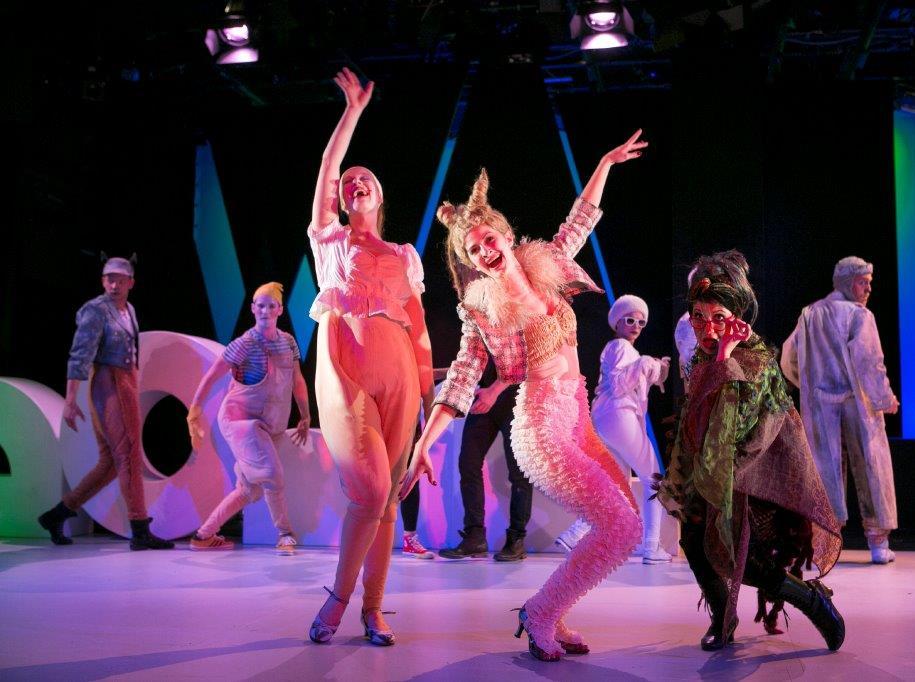Kevin Clarke
Operetta Research Center
28 March, 2015
“I had a dream” – and, yes, it was “a beautiful dream”; right in the middle of a performance of the new musical fairy-tale Grimm at the Neuköllner Oper. It started while watching the ten energetic, young and dazzlingly good (looking) cast members foxtrott away, in act 2, to a “retro” musical comedy number by composer Thomas Zaufke. Suddenly, I imagined these show-stopping performers in a production of Wiener Blut, of all things unlikely. And I thought: wouldn’t it be fun if they could go onto careers in operetta, at houses such as the Staatsoperette Dresden or Musikalische Komödie Leipzig, the Gärtnerplatz Theater Munich, instead of the obvious Stage Entertainment spectacles they will all surely end up in; losing what makes them so unique?

Scene from “Grimm” with Jan-Philipp Rekeszus as the wolf and Devi-Ananda Dahm as Red Riding Hood at the Neuköllner Oper. (Photo: Matthias Heyde)
The ten performers in question are final-year-students of the UdK Berlin, currently to be seen in the Zaufke/Peter Lund musical Grimm – Die wirklich wahre Geschichte von Rotkäppchen und ihrem Wolf. It is a charming piece re-telling various fairy tales but asking: what’s behind the old stories; is there more to them; should we believe what’s transported in them as value and wisdom? (Of course not.) In a beautifully directed and witty little production, choreographed by Neva Howard, you see outstanding young performers display a stage presence and vocal versatility – often coupled with magnetic star quality – that made me wonder: do they have to all go onto their obvious ways to the big musical comedy productions in Germany: Beauty and the Beast, Dirty Dancing, Mamma Mia and Phantom of the Opera? What about the operetta theaters, Volksoper in Vienna, the festival in Mörbisch, Staatsoperette, Musikalische Komödie, Ohio Light Opera, or even the Komische Oper Berlin?
Why are they not hiring such talent to refresh their repertoire and performance traditions?
Why are the casts of so many operetta performances so utterly wrong and boring, when there are such alternatives available? (Let’s re-call last week’s concert staging of Kurt Weill’s Silbersee conducted by Iván Fischer in Berlin where practically every single role was miscast.)
This is where the dreamy part of Grimm began.

The bubbly cast of “Grimm” at the Neuköllner Oper: Katharine Beatrice Hierl, Dennis Weißert, Anthony Curtis Kirby, Devi-Ananda Dahm, Fabian-Joubert Gallmeister (from left to right). (Photo: Matthias Heyde)
Seeing young “barihunk” Jan-Philipp Rekeszus as the big (not so) bad wolf, in a six-pack-exposing costume und with soaring vocal lines, swirling around the stage with various female partners, I thought what a grand Graf Zedlau in Strauss’s Wiener Blut he could be … And once that thought started to take hold of my brain, it developed further. Because, obviously, he’d be dream casting for other Victor Léon operettas too, Merry Widow among them. A Danilo like him would knock audiences sideways; he sure would knock any Hanna Glawari sideways. And he can dance and sing and act – and is a joy to look at. Not something you can say about most Danilos out there. So what is keeping directors in Vienna, Dresden, Leipzig or Mörbisch from hiring someone like Rekeszus?

Nicky Wuchinger in “Der Vetter aus Dingsda”. (Photo: Theater Bremen)
A few years back, the opera house in Bremen hired one of Rekeszus’s fellow students, Nicky Wuchinger, for Künneke’s Der Vetter aus Dingsda, conducted by Florian Ziemen and staged by Frank Hilbrich. It was one of the most remarkable operetta productions I have ever seen; and Nicky singlehandedly energized the last 30 minutes of the show with his stage presence and brought even the weaker songs written for Roderich to life. Instead of grabbing Wuchinger there and then, casting directors of operetta houses ignored him, and he went onto a career in Cats, Hair and currently Phantom of the Opera in Hamburg, as a dashing Raoul, Vicomte de Chagny. Two other fellow students, Maximilian Mann and Johanna Spantzel, sang selections from Kalman’s Arizona Lady in a production of Ein Herz sucht einen Parkplatz; a concert presenting operetta music from the 1950s. They, too, were incredibly good, yet again not hired by any operetta theaters. (To be fair, the Staatsoperette did a one-off summer concert with Spantzel, but then let her go.) So the two went onto various big musical productions, including Dirty Dancing. Kalman & Co. is not in their repertoire anymore. And Spantzel – with her light coloratura soprano – did not sing Adele or anything of the sort anywhere. It makes me wonder, what is wrong with the world?

Alexander Girardi as the Marchese Sebastiani in “Der lustige Krieg”.
The list of operettas that you could stage with singers like these – so well prepared for the world of the theater by their professors at the UdK – is endless. At a Johann Strauss conference in Vienna recently, Marion Linhardt pointed out that the later Strauss operettas written for Alexander Girardi need two outstanding male comics, e.g. Eine Nacht in Venedig. Seeing the comedy duo of Dennis Hupka and Fabian-Joubert Gallmeister in Grimm, both with ringing tenor voices and exceptional body control (plus comic timing) made me fantasize about them as Caramello and Pappacoda, with Rekeszus thrown in as a seductive Count of Urbino. This Strauss operetta will be seen at the 2015 Mörbisch Festival. And it deserves a better cast than Austrians got to see/hear at the Volksoper recently.
You could almost singlehandedly revive the genre with singers such as Wuchinger, Mann, Spantzel, Gallmeister, Hupka etc. The Staatsoperette is preparing Johann Strauss’s Cagliostro in Wien, another Girardi show. What a joy it would be to see the above mentioned gentlemen in that, instead of the staggeringly ill-suited casts usually presented, and recorded, in this Strauss Renaissance project. And that is also true for the ladies. Singers such as Sophia Euskirchen, Kiara Brunken or Katharine Beatrice Hierl with their strong voices, secure top notes and winning stage personalities, vulnerable artists such as Feline Zimmermann or bundles of energy like Devi-Ananda Dahm (all of them in Grimm) would bring these Strauss works to life in a way that past casts at the Staatsoperette did not.
While I dreamed on, in the midst of “Grimm”’s second act, I actually enjoyed the musical on offer.

Tenor Dennis Hupka in “Grimm” at the Neuköllner Oper. (Photo: Matthias Heyde)
In some of its best moments, and there are many, it had some bubbly reminiscences of 1930s musicals that are not unlike some of the fabulous Abraham, Kalman or Dostal numbers making a splash elsewhere. And that’s when I started seeing my dream-sixpack-operettas in wonderful Technicolor before me, with eyes wide open, because right in front of me there was wonderful three dimensional Technicolor. With music to match the magic!
(And let’s not forget the comic talent of people such as Anthony Curtis Kirby and the gravitas of Dennis Weißert …)
If in the future I have to sit through one more badly cast and boring operetta or Kurt Weill performance, there can be no further excuse. If you do not believe me, go have a look yourself at the Neuköllner Oper and check the Grimm cast out yourself.

The full ensemble of “Grimm” in a dance sequence, at the Neuköllner Oper. (Photo: Matthias Heyde)
For performance dates and additional details, click here.
PS: The Budapesti Operettsínház proved recently, with a production of Me and My Little Brother, that casting musical comedy singers in an operetta can be a highly rewarding exercise. And the Komische Oper Berlin has been doing it for some time too, with spectacular success at the box office.

Kevin, your review makes me wonder who these excellent UdK teachers are! Perhaps you could interview some of them?
RE: the dilemma of why the classical houses spurn these young singers
1) casting at mainstream houses is done through agents who have worked years to build relationships to employ their stables of singers – often regardless of their appropriateness for the roles (esp. operetta).
2) Those young singers probably want those big touring vehicles because they pay well and they give them the kind of status and credits they need on their resumes – which gets them an agent.
3) The unfortunate split between “art” (opera & operetta) and “musical theatre” (a commercial enterprise) means that singers, regardless of what their true career talents may be forced to choose the latter to survive.
Operetta, while we who read this website adore it, is basically a niche product for a niche audience. I personally think it’s a glorious combination of art and musical theatre, but the industry pigeon-holes it unjustly as a dated and musty relic. Only a few countries (Germany being one) dust them off and give them new life. If only every opera house had a clone of Barrie Kosky to change this kind of thinking!
THIS IS JUST A GENERAL QUESTION:
I am doing research on ROSE OF THE DANUBE the 1934 operetta by Arthur A. Penn and Geoffrey F. Morgan, published by Carl Fischer, Inc., LL.C., NYC. Do you know about this operetta? I have much research and data I would be happy to share???
Does anyone have any research on ROSE OF THE DANUBE, the 1934 American Scholastic Operetta by Arthur A.Penn and Geoffrey F.Morgan.
I have quite a lot and am willing to share?